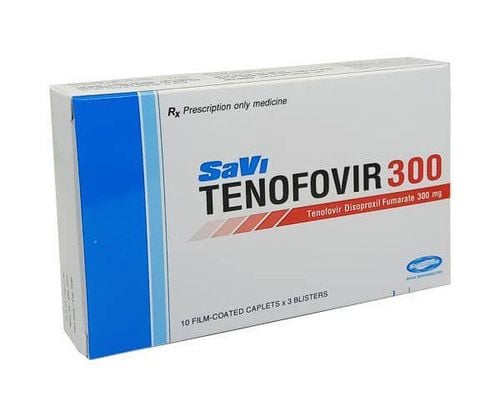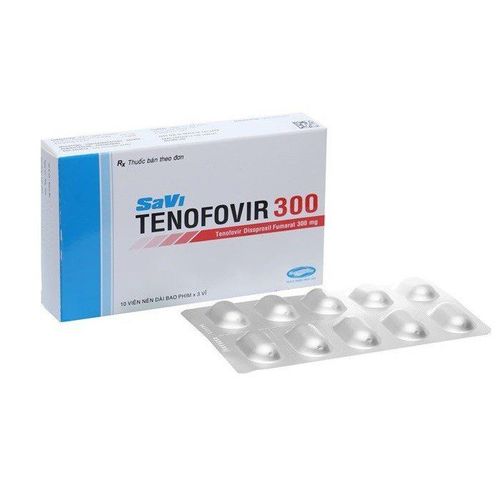This is an automatically translated article.
Zidovudin is a Thymidine derivative, which inhibits the replication and replication of Retroviruses, especially HIV. To know more about the detailed use and mechanism of action, please refer to the article below.1. Uses of the drug Zido
What is Zido? Zido - H 300 drug with the main ingredient is Zidovudin, which is prepared in the form of film-coated tablets. The drug is manufactured by the manufacturer Hetero Drugs., Ltd and is currently circulating in Vietnam with the serial number VN-5418-10.
Zido - H 300 is used to support the treatment of diseases caused by human immunodeficiency virus (HIV), patients with AIDS or in the ARC stage (AIDS related complex), adult patients with and without have signs and symptoms with a T4 (T-helper) cell count less than 500/mm3, and children infected with HIV have symptoms and a significant degree of immunosuppression.
2. The mechanism of action of the drug Zido
When entering the patient's body, Zidovudine will be Phosphorylated 3 times and form the active form Triphosphate. Zidovudine Triphosphate will competitively inhibit with Thymidine triphosphate of RT, however, because in the structure of Zidovudine Triphosphate lacks the -OH group at position 3, the Phosphodiester bond at the 3',5' position is not formed. As a result, DNA synthesis is terminated prematurely.
3. How to use and dosage Zido - H 300?
3.1. How to use Zido-H 300 Zido - H 300 can be used in many different ways such as oral, injectable, external... For oral Zido - H 300, use it directly with filtered water according to the dosage. , the time specified by a qualified doctor or pharmacist.
3.2. Dosage Adults: Take 600mg/day in divided doses (usually 200mg every 8 hours or 300mg every 12 hours). Children: From 3 months to 12 years: 180mg/m2 every 6 hours (720mg/m2/day), should not exceed 200mg every 6 hours; From 12 years old and up : Use the same dosage as adults; Elderly: No specific data are available at this time, however, the usual precautions should be taken if used in the elderly. Renal failure: It is necessary to check the concentration of Zidovudine in the plasma and glucuronide metabolite of the patient, combined with the examination of hematological parameters to adjust the dose accordingly; Hepatic Impairment: Accumulation of zidovudine in the body may occur in patients with hepatic impairment because of decreased glucuronidation. Dosage adjustment is necessary. Pay special attention to the signs of drug intolerance and increase the dose interval accordingly. In addition, it should be noted, the dose adjustment for patients with hematological toxicity is necessary. For patients with poor marrow reserve, especially in patients with advanced HIV infection. Note that when hemoglobin levels decrease, neutrophil counts decrease, the daily dose may be reduced until there is evidence of marrow recovery. Increase or decrease the dose after 2-4 weeks, depending on the patient's tolerability.
4. Side effects when using Zido-H 300
When using Zido - H 300, users may experience some of the following side effects:
Anemia, leukopenia, neutropenia: If using high doses (1200-1500mg/day) , Patients with a history of HIV (with marrow failure), especially in patients with CD4+ counts < 100 cells/mm3 ; Patients with polymorphonuclear leukocyte count: The incidence of neutropenia is increased, when zidovudine is initiated, hemoglobin levels and serum vitamin B12 concentrations are low or in patients receiving concomitant therapy. Paracetamol Common side effects: nausea, anorexia, headache, vomiting, rash, abdominal pain, insomnia, fever, muscle pain, malaise, asthenia and dyspepsia. Other side effects: drowsiness, dizziness, shortness of breath, diarrhea, sweating, flatulence, chest pain, loss of sensitivity, restlessness, urinary frequency, body aches, chills, cough, floating hives, itching, and flu-like symptoms. When experiencing side effects due to the use of the drug, should stop the drug or immediately contact the doctor for advice and safety.
5. Notes and cautions when using Zidon - H 300
For pregnant or lactating women, caution and caution should be exercised when using the drug because the drug's influence can have direct adverse effects on the fetus and breast-feeding baby. Consult and use as directed by your doctor to ensure safety for health. It should be noted that treatment with zidovudine does not reduce the risk of HIV transmission to others through sexual contact or blood-borne infection.
6. Zidon drug interactions
When using Zidon - H 300 with other drugs, there may be interactions, you should note:
When combined with lamivudine: Zidovudine's Cmax increased by 39% Combined with zidovudine and Rifamicin: reduced the bioavailability of Zidovudine from 4 - 48% When combined with Paracetamol: increase the rate of neutrophils, especially in the case of being treated for chronic diseases.... When used with foods or beer, alcohol, tobacco. ... can have an antagonistic or synergistic effect on drugs, which is caused by the presence of other active ingredients in such foods and beverages.
7. How to store medicines?
In order not to affect the stability, content and use of the drug, Zidon - H 300 should be stored at an appropriate temperature: Room temperature, in a cool, dry place, away from moisture or sunlight. Sun. Keep out of reach of children, and read instructions carefully before use.
Please dial HOTLINE for more information or register for an appointment HERE. Download MyVinmec app to make appointments faster and to manage your bookings easily.













